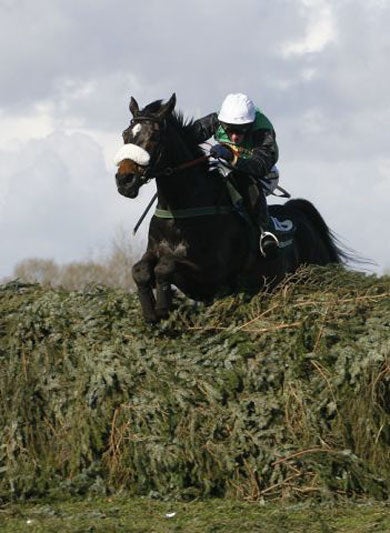Grand National: The major's funeral and the fairytale victory of a National hero he bred

It is always said that to find the winner of the Grand National, you should look for the fairy tale and if ever one was written in the turning stars, Saturday's was.
For two hours before the 10-year-old gelding Numbersixvalverde and his young rider Slippers Madden battled to a dream victory in racing's most gruelling event, the man who bred him - entirely appropriately a war hero - was laid to rest in an Irish country churchyard.
Major F Bagenal Boyd, MC, PAVO, late of the Punjab Frontier Force and Indian cavalry, had died three days previously at the age of 92. His funeral service, at Balloughton, Co Wexford, was timed so that the mourners could watch the horse their family had once owned take part in the famous marathon.
They had backed him to a man, and tears and cheers greeted Numbersixvalverde's six-length success at 11-1. "We all went back after the service to watch the race," said his son James, who lives at nearby Taghmon, yesterday.
"And there was just not a dry eye in the house. It was unbelievable the way it turned out, but people told us it is the sort of thing that happens. And half the village had latched on, and backed him. I phoned a friend and managed to get a bet on before we went to the church."
The Major had bought Numbersixvalverde's mother Queens Tricks at a Dublin auction 20 years ago as a yearling for just 800 Irish guineas, in the face of family opposition. "She had good pedigree but a crooked leg," recalled Boyd, "but he just had to have her. We had our usual equine row, which he won, as usual, and you'd have to say he was right."
As with many Irish farming families, there were always horses in the Boyds' lives, mounts to ride and hunt, mares to breed from, young stock to turn over for a profit.
Because of her wonky conformation, Queens Tricks never raced, but several of her close relatives did well on the track. One, Fatal Hesitation, stayed in Ireland and notched her finest hour for her sporting amateur rider-trainer Richard Keyhoe in the Conyngham Cup at Punchestown. Another, Man Of Mystery, came to Britain, and proved a smart chaser for trainer Nigel Twiston-Davies. And there was an Aintree connection two generations back. A horse called Leslie, Queens Tricks' great-uncle in human terms, had two cracks at the Grand National in the Sixties, but was impeded and brought down, through no fault of his own, each time.
The production of racehorses for the jumps is a long-term process because of the time-lag between conception and athletic endeavour. A steeplechaser is usually at least seven years old before he begins to reach his prime. The early omens for the foals that Queens Tricks began to produce were not good and the Boyds had sold her on long before her most famous son came good.
"Her foals seemed to be growing into rather small colts for us to sell," said Boyd. "We were cutting back on the broodmares a bit and because of that she was the one who went. And when we sold her, a neighbour said as sure as God made little apples that her offspring would now start winning." And that, of course, is exactly what happened.
The first to strike was a horse called El Cordobes, who was no champion but honest and durable, winning eight of his 60 starts. Numbersixvalverde, who was sold by the Boyds as a yearling and now carries the colours of Co Clare property developer Bernard Carroll and is trained by Martin Brassil in Co Kildare, proved the best of the lot with his gallant defeat of the two joint-favourites, Hedgehunter and Clan Royal, in the world's most famous and demanding race.
And the tough, talented near-black horse is, without being too whimsical, a fine memorial to the man who created him. Major "Bill" Boyd was an individual to whom adventure, challenge and straightforward bravery came naturally.
He went to Sandhurst, met his wife of 57 years, Dutch-born Willy, in Indonesia, and was reticent, even to his family, about the wartime engagements in the Asian theatre that earned him his battle honours.
"Pop could ride before he could walk," said Boyd. "And when he went to Sandhurst, he was in the top grade of four: there was those who had never ridden, those who could ride, those who had hunted, and those who had hunted in Ireland. He never told us about his MC, but a good friend in his regiment told us that if any of them were stuck in a bad place, they'd want Bill next to them before anyone else."
Subscribe to Independent Premium to bookmark this article
Want to bookmark your favourite articles and stories to read or reference later? Start your Independent Premium subscription today.

Join our commenting forum
Join thought-provoking conversations, follow other Independent readers and see their replies